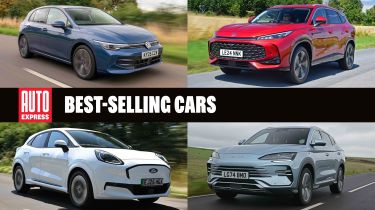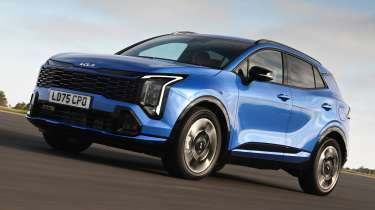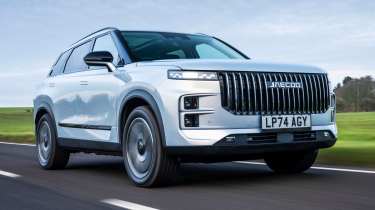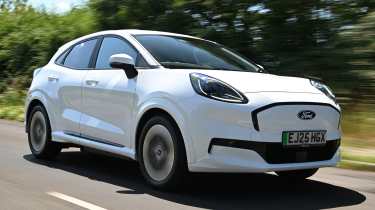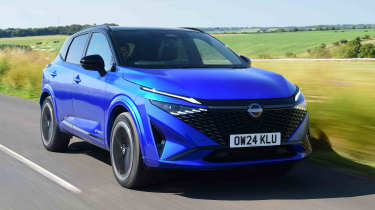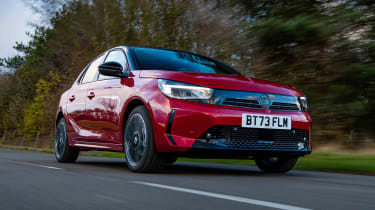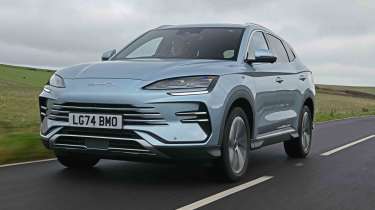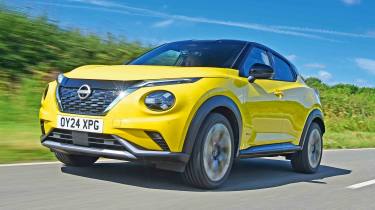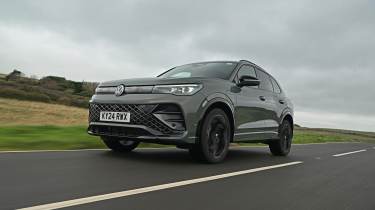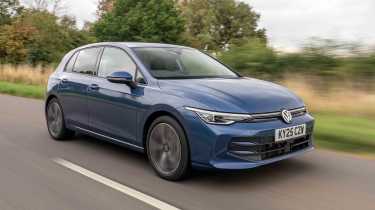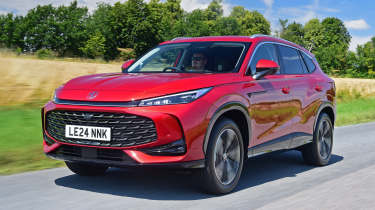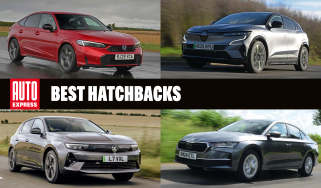Best-selling cars 2026: the year's 10 most popular models so far
These are officially Britain’s biggest-selling new cars so far in 2026, according to the Society of Motor Manufacturers and Traders (SMMT)
It’s still early days in 2026, but plenty of car brands are already setting their sights on the coveted title of Britain’s best-selling car, and you can see just how fierce the competition is below.
Unsurprisingly, the Ford Puma and Kia Sportage started the year off near the top of the charts, but Chinese cars like the Jaecoo 7, BYD Seal U and MG HS are all now mounting a serious challenge for the top spot by racking-up big sales numbers in January.
While the year is still young, SUVs currently hold eight of the top ten spots on this list, though the continued success of the Vauxhall Corsa and Volkswagen Golf show superminis and hatchbacks still have significant staying power.
If you’re looking to take the next step in your car buying journey, the Auto Express Buy a Car service has plenty of great deals for you to choose from. Simply tell us what car you’re interested in and our network of trusted dealers will make their best offers. We can also help you sell your old car in the process.
How did the new car market perform in January 2026?
In January 2026, the UK car market saw a total of 144,127 new cars hit the road and grew by 3.4 per cent compared to January 2025.
Electrified vehicles (Battery Electric Vehicles, hybrid and plug-in hybrid cars) have had a good start to the year, increasing their market share to a combined 46.9 per cent.
Petrol remained the most popular fuel type, taking up a share of 47.7 per cent, while diesel sat at a 5.5 per cent market share.
Best-selling cars in January
The Kia Sportage was the best-selling car in January with a total of 4,675 cars being registered, although the Jaecoo 7 gave it a good run for its money with a total of 4,059. The best-selling car of the past three years, the Ford Puma, made up the final podium place with 3,715 registrations.
While this might not have been the start to 2026 Ford wanted, the Blue Oval will take solace from the fact that its electric Puma Gen-E was the best-selling electric car in the UK for the month of January. The small SUV was helped in no small part by it being one of the few cars to qualify for the Government’s full Electric Car Grant.
Chinese cars were a common sight on this list in 2025 and it looks to be a similar story in 2026. Three Chinese cars currently sit within the top 10 in the form of the Jaecoo 7, BYD Seal U and MG HS.
As line-ups and the dealer networks expand, it’s likely that we’ll see more Chinese cars breaking into this list. They’re often competitively priced and come well equipped so the scope of choice offered, customer awareness and aftersales support will be crucial to deliver this expected growth.
Top 10 best-selling cars 2026
Without further ado, here are the UK’s official best-selling cars of 2026 according to data from the SMMT.
1. Kia Sportage - 4,675
Having just missed out on the overall best-seller crown in both 2024 and 2025, the Kia Sportage is off to a very strong start in 2026.
The fifth-generation Sportage has been around since 2021, although a facelift in 2024 has helped keep this mid-size SUV fresh. Its eye-catching looks, comfortable ride and attractive seven-year/100,000-mile warranty are clearly a hit with the car buyers.
2. Jaecoo 7 - 4,059
You’ll be forgiven if you’ve not heard of Jaecoo before as this Chinese brand is still a very new entry to the UK.
There’s a reason why the Jaecoo 7 is growing in popularity, though. It’s because this stylish SUV squares up to premium competitors like the BMW X1 and MINI Countryman, comes loaded with lots of kit as standard and has plenty of space. What’s even more attractive is the starting price of just over £30,000. We suspect you’re going to see quite a few 7’s on UK roads going forward.
3. Ford Puma - 3,715
The Ford Puma has been the best-selling car in the UK for the past three years in-a-row, but if the Puma wants to take the crown in 2026, it’s going to have to work hard for it.
Thankfully, the Puma has plenty of strengths. Not only is this small SUV one of the best handling cars in its class, it’s great value for money and well-equipped. What’s more, the electric Puma Gen-E qualifies for the full £3,750 Electric Car Grant.
4. Nissan Qashqai - 2,995
Think of mid-size SUVs and the chances are the Nissan Qashqai will be among the first cars to spring to mind. Besides, it’s been a pretty common sight on UK roads since the first generation car hit UK roads around two decades ago.
The latest Qashqai is arguably the best yet. While it does have some pretty bold styling, it retains familiarity where it matters with the usual solid build and practical cabin. Opt for the clever e-Power hybrid engine and you’ll be driving around in one of the best SUVs money can buy.
5. Vauxhall Corsa - 2,902
It’s safe to say that Britain loves an SUV, but the plucky Vauxhall Corsa is leading the way for supermini sales.
The Corsa is one of the most recognisable names on UK roads, and with such a wide variety of choice when it comes to trim, kit and powertrains, it’s easy to see why. With a starting price from under £20,000, it’s great value too.
6. BYD Seal U - 2,550
BYD might be one of the new kids on the block here in the UK, but that’s not stopping the Chinese brand from making waves on the new car market.
The BYD Seal U is clearly ticking the right boxes. Not only does this plug-in hybrid undercut quite a few competitors with its £33,000 starting price, but it’s equally as spacious, well equipped as standard and has a very usable all-electric range of up to 78 miles on the WLTP tests.
7. Nissan Juke - 2,517
The quirky Nissan Juke has been a sales success for Nissan and it doesn’t look like this will change anytime soon.
The second-generation Juke has been on sale since 2019, but a mid-life facelift in 2024 has helped this small SUV keep pace with rivals. Nissan didn’t change the formula too much as it’s still great to drive, and as practical as ever but the infotainment system is much more intuitive to use.
8. Volkswagen Tiguan - 2,425
If you’re after a no-nonsense family SUV, then the Volkswagen Tiguan should fit the bill perfectly with its solid all-round abilities.
From the entry-level Tiguan to the high-performance Tiguan R-Line, it’s a very capable and practical car which feels more upmarket than many of its rivals. Running costs are reasonable, and with petrol, diesel and plug-in hybrid powertrains all available, there should be a Tiguan to suit most people.
Latest Volkswagen Tiguan deals
9. Volkswagen Golf - 2,072
While SUVs are the flavour of the moment, the humble hatchback is still a sought-after bodystyle and the Volkswagen Golf is proof of that.
The eight-generation car had a few niggles which weren’t too popular with buyers, but a recent facelift aimed to right these wrongs. Gone are the annoying haptic control panels and the fiddly tech has mostly been ironed out.
Whatever you want in a car, chances are there’s a Golf to suit your needs. From a simple family runaround to a fire-breathing hot hatchback, this long-standing model remains a firm favourite.
10. MG HS - 2,035
MG as a brand is on a roll at the moment and the HS is proof of this.
The mid-size SUV sector is fiercely competitive, but with a low starting price from around £26,000, petrol, hybrid and plug-in hybrid powertrains, as well as a strong seven-year, 80,000-mile warranty, MG has clearly struck the winning formula, squeezing into the best selling cars top 10.
Sales vs registrations: inside the numbers
There’s an important distinction to be made where the UK’s monthly and annual ‘car sales’ figures are concerned. Namely, that they don’t actually count the number of cars sold in the sense that many people might expect. The numbers provided by the SMMT are for car ‘registrations’ rather than being sales figures.
When customers buy a new car, it is registered before it can be driven on the road, but cars are also registered by manufacturers and dealers before they have a customer to go to.
This practice of processing pre-registered cars is done for various reasons, but often the goal is to move stock through the supply chain, avoiding bottlenecks or to hit targets. It means that a significant proportion of the cars in the figures could be pre-registered, and estimates of how many range between 10 and 20 per cent.
Tell us which new car you’re interested in and get the very best offers from our network of over 5,500 UK dealers to compare.

